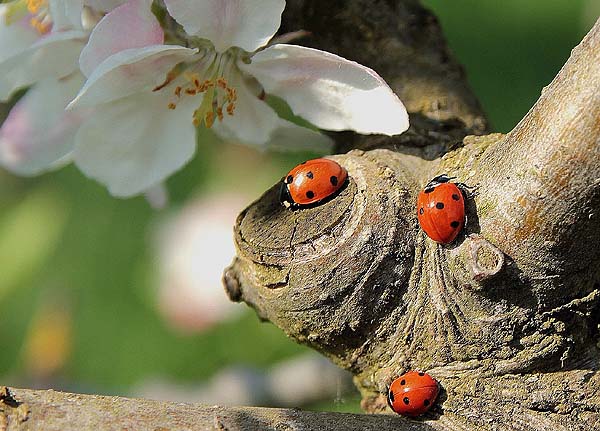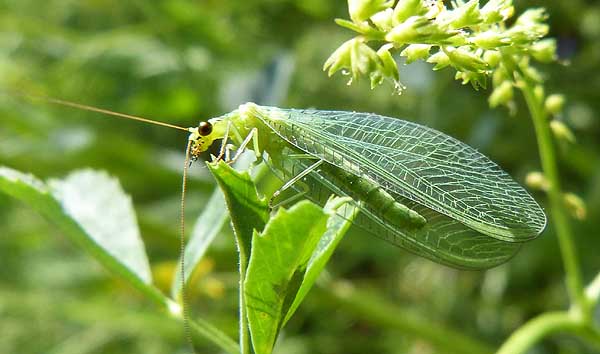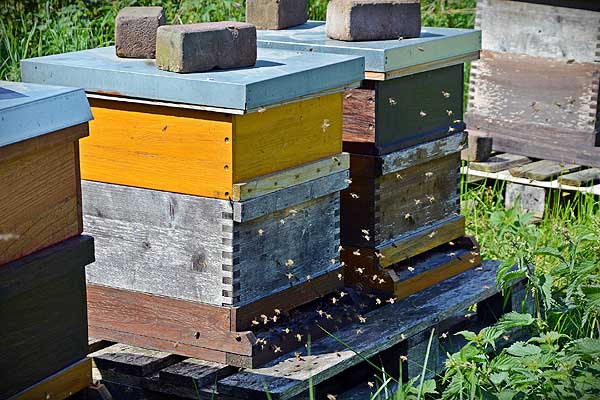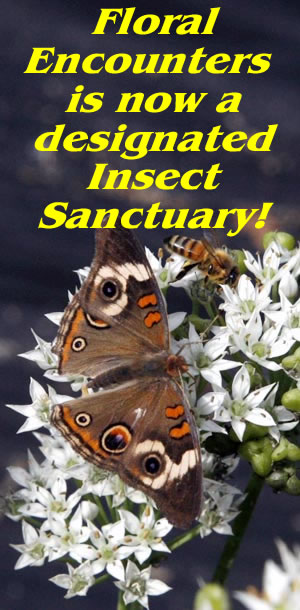Help to save the insects and the planet.
Chemical Use Guidelines
1. NEVER use roundup (Glyphosate).
It is extremely toxic to soil life. While the manufacture states that
it only kills the plant this is NOT TRUE. Many scientific studies have
proven that it kills everything in the soil and it stays there to ensure
that nothing lives in that soil for a long time afterwards. We did a test
patch on an area outside our major farm to kill of Japanese honeysuckle.
One of our guys sprayed an isolated section about 8 feet x 8 feet. That
was TEN YEARS ago and to this day nothing has ever grown there. We were
horrified.
If you have areas that have weeds that you need to remove check our article
on weed control without glyphosate.
The world health organization has now designated glyphosate as a 'possible
carcinogen' so its much better to keep it out of your yard, and away from
you, your family and your pets. Be safe not regretful.
2. Don't spray just because there are bugs.
Bugs are NOT bad. Just because there are bugs on a plant, or in your yard
does not mean they are bad. Don't kill bugs just because you can. For
the most part they will leave you alone if you leave them alone. They
live in your garden and were living their long before you were so just
let them be. Only deal with bugs if they are causing a specific problem
which is not just because they are in your yard. They are most likely
helping your yard not hindering it.

3. Stop using chemicals on your garden.
Other chemicals are not really that safe either. Just because something
is for sale in a big box store does not mean its safe. Sadly most people
are aware that bleach is toxic and would not allow their children to play
with it but don't consider that a granular lawn chemical or a bottle of
plant spray is a problem. Keep them away from yourself and your family.
For the most part the garden does not need chemicals to control it. The
only reason it does is because its not been grown as a proper ecosystem.
If you grow a variety of different plants and a good healthy 'lawn' then
you should not for the most part need them.
4. Try and dissuade your neighbours from using chemicals too.
You want to create a great habitat that is good for your garden and good
for the insects and animals that want to live there, but if you neighbour
is spraying their garden, especially on a windy day, then it can have
disastrous results on your land too. Ask them to tell you when they are
going to spray so you can be prepares, maybe even dissuade them. Make
sure they don't spray if there is any wind.
We were very proud of the wonderful insect population we had built up
on our farm, then a new vegetable farmer moved in across the road and
he sprayed his crops one day when the wind was blowing. Of course he sprayed
in later spring during a time when the bees were out foraging. Our insect
population vanished! All the bumble bees were gone entirely, the honey
bees vanished. The one hive of honey bees we had died in the hive overnight.
We were devastated. Slowly very slowly the bee population is returning
but it took us ten years to build it up and one day for this idiot to
kill it all. (Fortunately his farm failed and he left, usually I am sad
when farms fail but not this one).
5. If you feel you have to spray don't do so without checking your
plants first. You may have helpers you did not know were there.
An example: Commonly people will spray for aphids. This is most often
not necessary especially if you have a well rounded garden. If you see
a few aphids don't panic and spray. Wait. For the most part the lady bugs
will turn up, they eat the aphids and lay their eggs the blue and yellow
larva are voracious aphid eaters and will often clear up an aphid infestation
without any intervention on your part. Sadly most people see aphids they
also see ladybug larva think they are bad and kill everything. Make sure
that you are not spraying too early and killing all the bugs that were
eating your aphids down without your intervention. We have never sprayed
for aphids. Sure we get infestations but if we leave it a week the predators
move in and within 10 days they are usually all gone.
This is just one example, and it does not just apply to aphids but to any infestation. For the most part other insects will come along and eat them up. Lacewings are also a great predator so if you see an infestation check to see if the predators have moved in. If they have then leave it a bit and see if they will do the job for you, very often you find you don't need to spray at all.

6. If you have a pest maybe you can remove it without chemicals.
Often a pest moves in and its on one stem of a plant, this is often common
with blackfly. If so cut off that one stem, put it in a plastic bag seal
it and throw it out. The rest of the plant is uninfected and you did not
need to spray. If its on just a few leaves, then remove the leaves and
remove the pest. The same thing applies to all plants, trees and shrubs.
Often if an pest is spotted early it can be eliminated just by cutting
off that branch or twig and removing the pest. The plant will recover
better than if its has been dowsed with toxic chemicals which don't do
the plant any good while they are killing the bugs. This is our main method
of pest removal. Sometimes you can just pick leaves from a plant to remove
pests or even pick them off if there are only a few.
7. If you absolutely MUST spray check for beehives first.
You may not know it but there could be a beekeeper very close to where
you live. Beekeeping is on the rise all over the country. All states ask
their beekeepers to register their hives with them. This is so the state
beekeeper can inspect the hives but also its there so that farmers and
other people spraying can alert the beekeeper that they are going to spray
and the beekeeper can pen up their bees that day so they don't get killed.
So if you have to spray contact your local agricultural agency and see
if there are any hives listed for your area. Then tell them what you are
doing before you do it. That way they can protect their bees. Sadly not
all farmers adhere to this rule if they did we would have been informed
about our neighbour spraying and our bees would not have died. Don't be
that person, save the bees. This of course applies only if you are spraying
a significant amount of your yard, if you are just spraying one plant
with a can of spray its not going to be a problem for the bees.

8. Be very sparing if you must spray.
While sometimes it is necessary to spray if you have a really bad infestations
on your plants try to use as little chemical as possible. This is not
a case where more is better. If you spray a lot it will be more stressful
to the plant. If it sprays to the point of dripping onto the soil it can
kill soil life and affect the roots of the plant. If this happens the
plant will get more stressed than it already is and most likely be even
more susceptible to further infestations.
9. Don't spray if there is any kind of breeze.
If you spray in a breeze or wind then the spray will drift onto other
plants that you don't need to treat. It can also drift over to your neighbours
yard or even onto the crops of a farmers field if they are close by. Remember
that even though you have sprayed for a specific pest the chemical it
will still kill a lot of other things as well. It will kill almost anything
that lands on the plant you are treating and it will kill anything else
wherever else that spray has travelled too. You can kill a massive number
of beneficial insects in the process of killing a few bad bugs. Make sure
you protect as many good ones as possible.
SPRAYING BY CONTRACT COMPANIES.
1. Don't allow any contractors to spray your yard without notifying
you first.
Today many people use landscape companies to do their yard work for them.
Don't allow them to just spray your yard without telling you. In many
cases spraying is not needed at all but the company may say that it is
so they can spray and make more money. Unless you have an extremely good
landscaper most are interested only in cutting the lawn, putting chemicals
on it (because they can make a good profit) and going to the next job.
So don't allow them to spray unless it is truly necessary which is not
just because they say so.
2. If your landscaper must spray make sure you tell your neighbours
about it first.
Landscapers are on a schedule they are not going to care if its windy
or not so your spray could end up on your neighbours child, infant, pet
or whatever and they could have bad reactions to this. In extreme cases
it could cause a lawsuit especially now people are becoming more aware
of the dangers of some chemicals. So be cautious and let them know in
advance.
3. Make sure any contractors notify that they are spraying.
If you hire a contractor, landscape company or anyone to come and spray
any pesticides on your land make sure that they are going to notify any
local beekeepers. This is important if you are having trees sprayed when
they are flowering (which is illegal in many states now) or any other
major spraying done in your yard. Remember that any spraying that is done
will not just affect the insect pest that you are spraying for but ever
other insect that comes into contact with that plant during and after
it has been sprayed. Sadly most companies don't really care if they spray
at the wrong time or kill insects. If caught they may have to pay a fine
but usually its not very high and they just consider it the 'price of
doing business' and ignore it. So if its really really essential that
you must spray make sure you know what you are getting into.
4. Make sure that the people applying the spray have a pesticide license.
In all states individuals that spray noxious chemicals on landscapes,
plants, farms etc MUST have a pesticide license. This means they must
attend a certain number of courses per year to obtain credits. A certain
number of credits is necessary to obtain and then keep a license. This
must be done every year.
However. In many cases a few of the people in a landscape company have
such licenses but they allow other employees to spray the chemicals under
their license. This is Illegal since the person has not had the correct
training in chemical handling. If someone is going to spray on your land
makes sure you ask to see their license and ensure that the person who
owns the licensee is the one who is going to spray.
This does not mean that this person is going to do a good job only that
they hopefully know how to use the chemicals they are spraying.
5. Be aware that the chemicals that a professional can obtain can
be more toxic and noxious.
Once someone has the pesticide license it allows them access to more toxic
chemicals than you can buy for yourself. So it means more toxic sprays
in your yard to kill more insects and expose you, your family and your
pets too as well as your friends and neighbours. Take this into consideration
before you allow anyone to spray your yard for any reason.
My thanks to the great photographers at Pixabay for most of the images in this article.
OTHER ARTICLES ON INSECT DECLINE AND HOW TO HELP
Lets save all the bees, not just the honey bees.
What a huge drop in insect numbers will mean to us
Some insects will survive the die-off.
Chemical Use Guidelines. Help to save the insects and the planet.
What you can do to help save the insects
Just buying organic is not enough to save the insects
References used in creation of these articles.
| Janice Hazeldine PhD is the owner and head grower of Floral Encounters an organic Medicinal Herb farm that is also a designated sanctuary for pollinators. |





